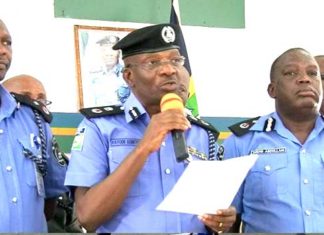By Onyewuchi Ojinnaka
Waripamo-Owei Dudafa, an embattled former Senior Special Assistant on Domestic Affairs to ex- president Goodluck Ebele Jonathan, standing trial along with one Iwejuo Joseph Nna on alleged N1.6 billion money laundering, on Friday lost his bid to stop the Economic and Financial Crimes Commission (EFCC) from re-arraigning the duo on a new amended charge filed by the Commission.
The duo had filed an objection to an amended charge by EFCC on the ground that it would amount to starting their trial afresh.
But in a ruling by Justice Mohammed Idris on the objection and arguments canvassed by counsel to parties, he dismissed Dudafa’s objection to the amended charge.
The judge held that an amendment is permisible by law at anytime before judgement. He added that once there is an amendment, the accused are expected to plead to same.
“Section 396(7) of the Administration of Criminal Justice Act allows the court to conclude part heard matters within reasonable time, and I have no doubt that this falls within the ambit of law.
“This court is sitting pursuant to a fiat, and this fiat is not open ended but will expire after its time, and the trial will begin de novo before another judge.
“The defendants are at liberty to call or recall any witness in the case. In my opinion, a reasonable time is when the time for justice does not wear out against the parties, but is seen to be done” the judge further held.
In view of the ruling which dismissed the objection of the defendants, the court ordered them to take their plea on the new amended charge.
They were consequently re-arraigned on the amended charge of 22 counts before Justice Idris at a Federal High Court sitting in Lagos, Nigeria. They pleaded not guilty to all the counts.
It was alleged by EFCC that they committed the offence on June 11, 2013.
They were first arraigned in 2016, before Justice Idris, on 23-counts charge of conspiracy to conceal proceeds of crime amounting to N1.6 billion.
The court then allowed the accused to continue with the previous bail earlier granted by the court.
After their re-arraignment, the defence informed the court that they would need to call their witnesses afresh.
In response, the prosecutor, Mr Rotimi Oyedepo, told the court that even if they wished to recall any of the prosecution witnesses, he would oblige them.
The court thereafter adjourned the matter until November 19, for trial by 1pm.
The prosecution had closed its case on March 16, but the accused opted to make a no-case submission in its defence.
Defence had urged the court to dismiss the case, on the grounds that the prosecution failed to establish any case against them.
Justice Idris had in a ruling delivered in August, dismised the no case submission of the accused, and ordered them to open their defence.
Defence had since opened its case, after which the court adjourned for adoption of final written addresses.
On November 12, the prosecutor, Oyedepo, informed the court of an amended charge against the accused, and told the court that same had been served on defence, and urged that the accused be re-arraigned.
In response, defence counsel, Messrs Gboyega Oyewole (SAN) and Ige Asemudara, respectively, resisted the move by prosecution, on the grounds that they had not studied the amended charge.
The court had then adjourned for hearing of arguments on the new charge.
On November 15, defence counsel had respectively argued their objections in opposition to the amended charge, urging the court to strike out same.
They argued. that the amendment would prejudice the case of the accused, adding that Justice Idris, who had been elevated to the Court of Appeal, lacked jurisdiction to allow the amendment, as he was only empowered to conclude cases.
They further argued that an amended charge was a fresh charge, adding that the court was not supposed to hear fresh cases.
In response, the prosecutor argued, that even before final addresses were filed, he had given the defence notice of the said amendment.
He argues that the amendment had not divested the court of the power to go on with the case pursuant to Section 396 (7).
He had urged the court to allow the charge and cause the respective pleas of the accused to be taken.
In the charge, EFCC alleged that the accused on June 11, 2013, conspired to conceal the sum of N1.6billion, which they reasonably ought to have known formed part of proceeds of unlawful act.
The offences contravene the provisions of Sections 15 (2), 15(3), and 18 of the Money Laundering Prohibition Act, 2012.













